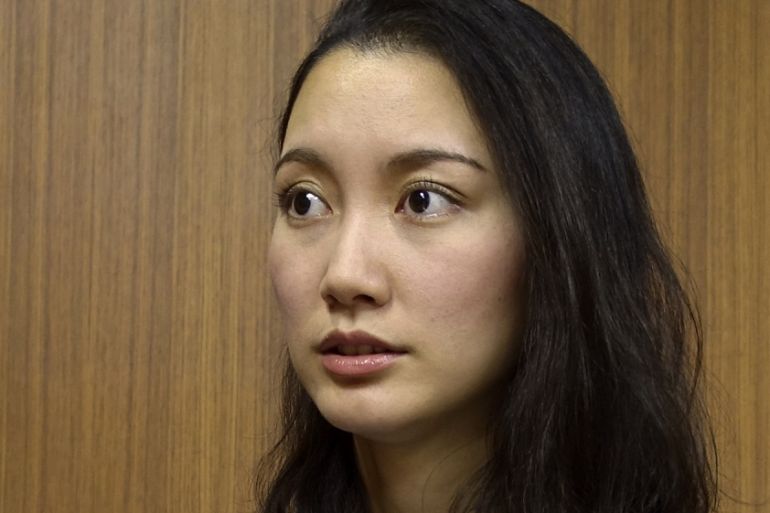Japan’s not-so-secret shame
In the #MeToo era, it’s high time for Japan to change its archaic and sexist approach to sexual assault.

Mika Kobayashi was on her way home one day when men forced her into a van and raped her. She went public about the sexual assault eight years later, in 2008, in a book that chronicled the incident, and the nightmare that followed.
Catherine Jane Fisher, an Australian, was raped in Japan in 2002 by a member of the US military. Dismayed by the police handling of the case, which she said made her feel like a criminal, Fisher took matters into her own hands by filing a lawsuit against the rapist and going public about what happened to her.
Keep reading
list of 4 itemsPrison demanded for Spain’s ex-football boss Rubiales in kissing scandal
The problem with British policing is not ‘just a few bad apples’
Homes of Sean ‘Diddy’ Combs raided amid sex offence lawsuit
These are two brave women who broke Japan’s silence on rape. More recently, another woman, 28-year-old Shiori Ito, did the same.
“Japan’s Secret Shame”, a documentary aired last month by the BBC, focuses on Ito’s allegation that an acquaintance raped her in 2015. Although Kobayashi, Fisher and Ito’s experiences span 15 years, their stories are alarmingly similar. All three describe abusive police investigation techniques, failure to take sexual violence seriously, lack of support for victims, and at times, society’s unwillingness to understand their pain.
A particularly horrifying detail is that Japanese police, as part of their investigation, sometimes force victims to reenact the assault with a life-size doll, while being observed and questioned by officers. This “investigation technique” is abusive, unnecessary, and retraumatising for victims.
Over 95 percent of incidents of sexual violence in Japan are not reported to the police according to government figures, and for good reason. Discussing rape is perceived as “embarrassing” in Japan and public opinion often sways towards blaming the victim rather than the attacker.
Until last year’s legal reforms, Japanese law defined rape solely as involving violent penetration of a woman’s vagina by a man’s penis. This prevented many female rape victims and all men and boys who had been raped from seeking justice.
In 2017, Japan’s parliament passed reforms to the rape law, expanding the definition to include forced oral and anal penetration, lengthening sentences, and permitting prosecutions to move forward without the victim’s consent. These were positive steps, but major problems remain, both with the law and with how it is carried out.
The Japanese government shouldn’t wait for victims to come forth demanding change, but should move ahead now to reform what is still, despite the recent improvements, a hopelessly antiquated – and sexist – system for dealing with sexual violence.
The law still permits rape charges to be raised only when “violence or intimidation” was used, except in cases of guardians abusing children. This requirement ignores the fact that rape often occurs without the use of obvious force or threat – for example, when someone is too afraid or shocked to resist, is incapacitated due to drugs or alcohol, or there is a lopsided power dynamic. Requiring proof of “violence or intimidation” excludes many cases that should be treated as rape and forces prosecutors to prove an element that should not be required and is more difficult to prove than lack of consent.
Countries around the world, prompted by evolving societal perceptions of sexual violence, are changing legal definitions to reflect an understanding of rape that is based on lack of consent, not the use of force.
The Japanese government should also remove this requirement and take further measures to train police officers and prosecutors to handle rape cases in appropriate and humane ways, including ending all use of re-enactments involving the victim.
The government should also guarantee all victims have access to 24-hour hotlines and one-stop-centres across Japan and ensure immediate and compassionate collection of forensic evidence based on professional standards and procedures. The government also needs to ensure all victims have access to female police officers with special training to deal with sexual violence who work in partnership with social workers.
The government should also continue to improve its victim assistance services such as screening and treatment for sexually transmitted diseases, HIV prevention medications, pregnancy testing, and abortion services. Victims also need legal assistance and longer-term access to counselling and peer support.
These are neither big nor new demands.
Some have been made for years by the United Nations expert committee on the Convention on the Elimination of All Forms of Discrimination against Women (CEDAW), an international treaty Japan ratified in 1985. Some have been recommended by the Japan Federation of Bar Associations. Some have even been raised by the research committee of the Japanese government’s Gender Equality Bureau Cabinet Office.
The Japanese government should show these brave women, and the world, that their voices won’t go unheard.
The views expressed in this article are the author’s own and do not necessarily reflect Al Jazeera’s editorial stance.
